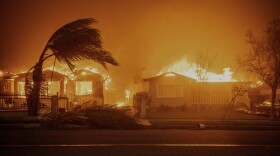On Wednesday, Turkish military forces entered Syrian territory, attacking US-backed Kurdish militias who have been fighting the Islamic State militia group.
Across the world here in San Diego, the Kurdish community was gripped with fear and outrage.
Turkey has long considered the Kurdish minority in Syria as a source of terrorism and on Wednesday, its troops began to roll in and fire on Kurdish-controlled cities.
Ahmad Zadah is a Kurd born in Syria. He emigrated to the US in the 1980s and still has family and friends there. To him, the withdrawal of American forces from the region in anticipation of the Turkish invasion is a deep betrayal, after the Kurds fought for years against Islamic State.
“I have not met a single American who did not appreciate the sacrifice the Kurds made fighting ISIS,” Zadah told KPBS. “The Kurds lost 11,000 people fighting ISIS to protect the United States, to protect the West. They lost their lives over there to protect humanity.”
He hasn’t been able to turn away from the news all week.
“I’m just so upset, I haven’t been to work since Monday,” Zadah said. “I went yesterday for a couple of hours and then I came back. Today I haven’t been at work yet. I’ve been glued to the news. Hope for a glimmer of good news … . Even when I go to work, I’m not myself.”
RELATED: San Diego Kurdish Leader: Pulling US Troops Out Of Syria Could Lead To ‘Genocide’
Ahmad’s daughter, Sherin, was born in the US. She’s planning to return next year to Iraqi-Kurdistan to start an educational nonprofit and is active in the local Kurdish community.
“As a Kurdish-Syrian-American, it’s a mixture of anger and confusion. Anger at the lack of reaction from the international community,” Sherin told KPBS. “ I expected more of a reaction from the UN, from NATO, because these were international bodies that were created to protect minorities from this exact situation.”
The Kurdish population in America is relatively small but has seen a serious uptick since the outbreak of the Syrian Civil War in 2011. Along with Dallas and Nashville, San Diego is one of the largest centers for Kurdish-American life.
Many Kurds are also part of the larger Syrian community in San Diego, which has come together during the eight-year-long civil war.
Yara Ayache is the Director of Operations at the Syrian Community Network in San Diego, a non-profit that helps asylum-seekers and refugees resettle in the US. There are over one-thousand Syrian refugees in San Diego.
“It’s a collectivist community, so they really rely on each other. They lean on each other a lot,” Ayache told KPBS.
The Trump Administration has announced it plans to slash the number of refugees admitted into the US next year, leaving many Kurdish asylum applicants in an increasingly volatile situation without a path to safety.
“With the new resettlement numbers, 18,000, which is extremely low for the US, a lot of them are here, but a lot of them still have families back home,” Ayache said. “We have sisters that are here and their entire families are still overseas. So the stress really comes from that they don’t know if they’re going to see their family again. They’re worried and they’re just hoping that they make it through.”
President Trump has argued that America has spent enough money protecting the Kurdish minority. Lawmakers on both sides of the aisle have criticized the move.
Ahmad says that residents of San Diego can help support the Kurdish community by getting in touch with their elected representatives.
“I plead to the people in San Diego, I’ve been living here for fourteen years, I do consider myself to be from San Diego, to please write to your congressman. Write to your senators,” Ahmad said.
Friday, Ahmad and Sherin will be protesting alongside other Kurdish-Americans outside of the federal building in downtown San Diego, in an effort to stop what is quickly becoming a desperate situation for the Kurdish people in Syria.







